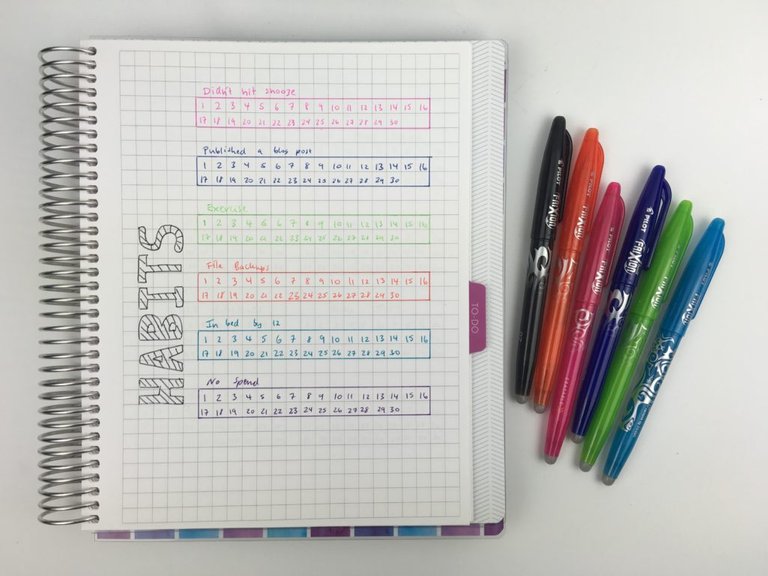Recently, I’ve heard a lot of people credit their success partly to tracking mundane activities that we do throughout the day. Myself, I’ve never been a fan as I’ve considered it to take up too much of my time and get me too focused on irrelevant details. You know, the 20% that don’t matter. Instead, I’ve built a philosophy around the idea of simple rules, where I’ll know that by applying some general principles the outcomes will be according to what I want.

However, having listened to the case for tracking behaviours being made, I see that I may have overlooked some benefits that it can have for self-improvement. Reasons that make me want to give it a try to see the results.
The two circumstances that I’m thinking of are:
- To analyse the status quo, or do an “as is analysis” with the purpose of getting a clear picture of the behaviours, many of which I may not even be aware of, that I am doing and how much of my time they are really taking up.
- To see whether the process of tracking activities itself can assist in establishing new desirable habits by helping keep myself accountable for the actions that I make and their contributions to making the change that I have promised myself to make.
Why tracking works
We can't improve what we're not aware of.
It is, therefore, problematic that most of us have built up habits and behavioural patterns that we're no longer aware of. We spend more money than we think. Consume more crap food than we think. Spend more hours on the phone than we think. Get less quality sleep than we think. Etc. So if the goal is to improve on those things, we must begin by understanding what it is that we’re actually doing. Likely, it will be different to what we think we are doing or should be doing. One solution, therefore, can be to track our current behaviours.
Needless to say, tracking everything at all times can be tedious unless easily automated (like having a step counter on our phone or an app that tracks time spent on the phone and in different apps). For other things that are not as easily tracked autonomously, doing it periodically to perform an "As is" analysis can be beneficial.
But the real hack, however, is that beginning to track such behaviours is likely to become an input variable affecting our behaviours and thus the results. That's because we are now aware of what we are doing. Adding this reinforcement to ensure that we do what we want to do for at least 30 days can help install new and lasting habits.
What I’m going to start tracking
To see whether tracking can be beneficial to me, I’ve decided to give it a try for one month with the goal of tracking two activities. Seeing as it can work for both positive and negative habits, I’ll be tracking one habit that I would like to do more of (establishing a new habit) and another thing that I would like to do less of (removing a bad habit).
As my main goal right now is to optimize my day around having more energy and less fatigue, I will make the goal to add more cardio to my week and also spend less time on my phone receiving distractions and unnecessary stimuli.
Thus, the two things I will track are:
- Number of cardio activities per week (goal 2-3).
- Number of times that I check the prices of cryptos per day (goal 1).
Cardio
Although I go to the gym and do strength training 5-6 times per week, that’s no excuse for not getting 15 minutes of running in during the early morning. I would benefit a lot from both! But having a too vague goal of “running more”, or just thinking “I should probably do more running”. I will now insist on alternating running 2 and 3 times per week (2.5 on average).
To ensure that I do that, I will time-block this into my mornings those days where it fits best with the rest of my schedule. Then, I’ll keep a simple log where I can cross out if I did follow my plan that day or not.
Checking crypto prices
I will also write down each time I look at my phone to check the prices of cryptos. I find this addiction to be really destructive. First, it’s a waste of time, as I’m not going to do anything differently anyway. Second, it triggers unnecessary stress. Third, it may often result in me spending additional time on the phone than I intended to, or additional time fantasizing about “what if I had instead sold my tokens at that price and then bought at this or that”. You all know what I’m talking about.
With the goal of making point 2. Even more likely to positively contribute, I’ll keep a small notebook with me at all times where I’ll write down the date and time every time I check crypto prices on my phone. I hope that this will be so tedious that it will deter me from the behaviour simply by making the thought of having to take out the notebook and writing something down seem unattractive enough to keep me from checking the prices. I hope this can take me from probably checking prices 10 times+ per day down to 1 time.
Expectations and follow-up
My hope is that the mere attention to the tracking will help me significantly reduce the number of times I turn to my phone throughout the day and the amount of time that I spend on it in total. It is easy to think that checking it only takes a few seconds, but that fails to account for the extra time spent once you’ve taken it out of your pocket and unlocked the pin. The few seconds intended for checking a price suddenly turn into a few minutes reading news or looking at social media, which again triggers thought and daydreaming that is mentally draining and distracting. As for cardio, I know that I’m stubborn enough to insist on doing what I set my mind on. Thus, I do believe that I will be able to accomplish the goal.
What I am more curious to see is if I’ll find the tracking process itself tedious or not. Perhaps I will get used to it after a few days and not really mind. If so, then once my new habits are fully established, I can move on to track something else. Perhaps this will be a new technique that can help me find room for improvements here and there and implement lasting positive change? I sure hope so!
